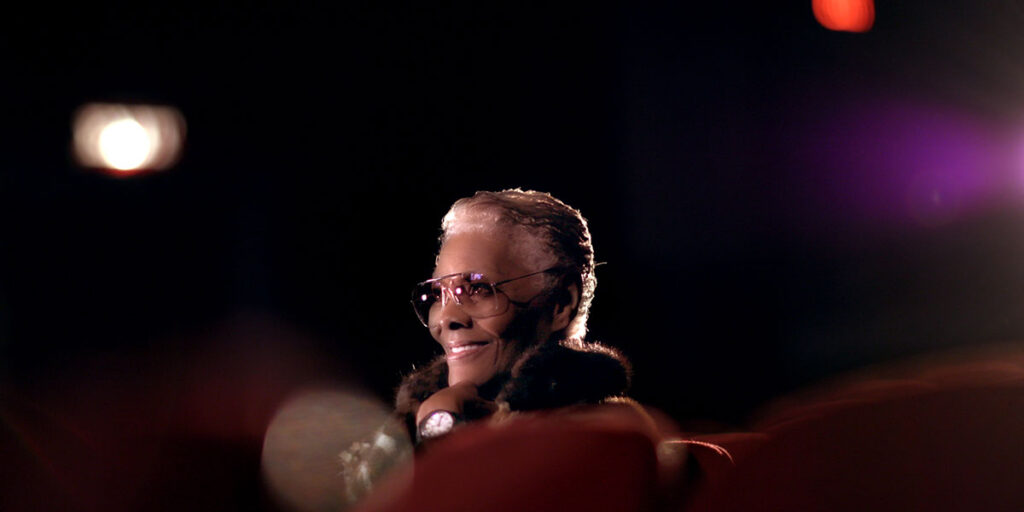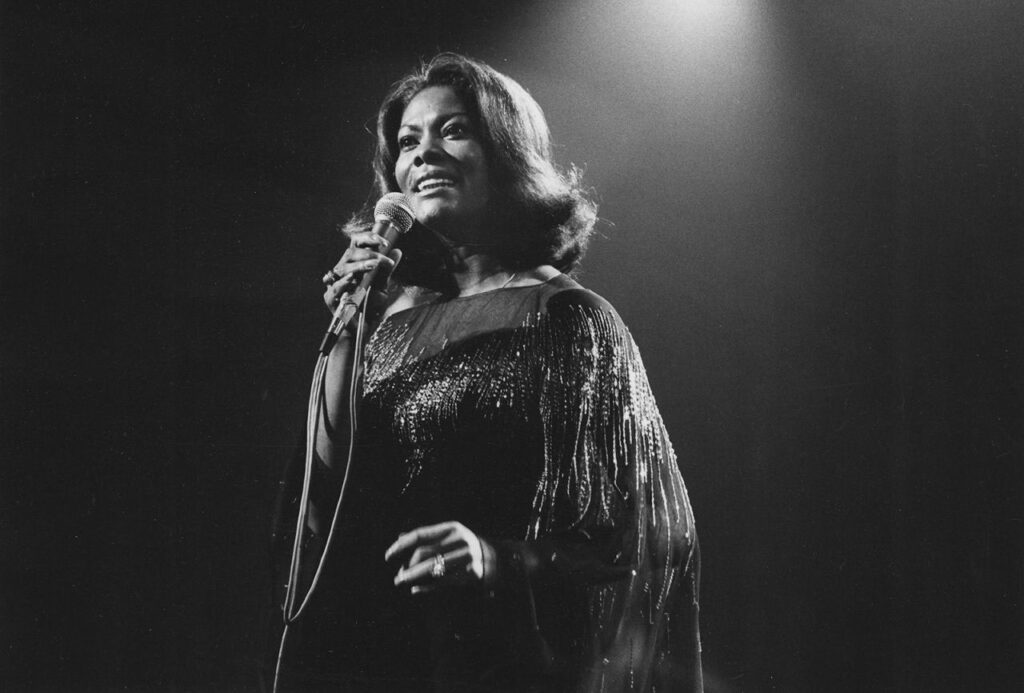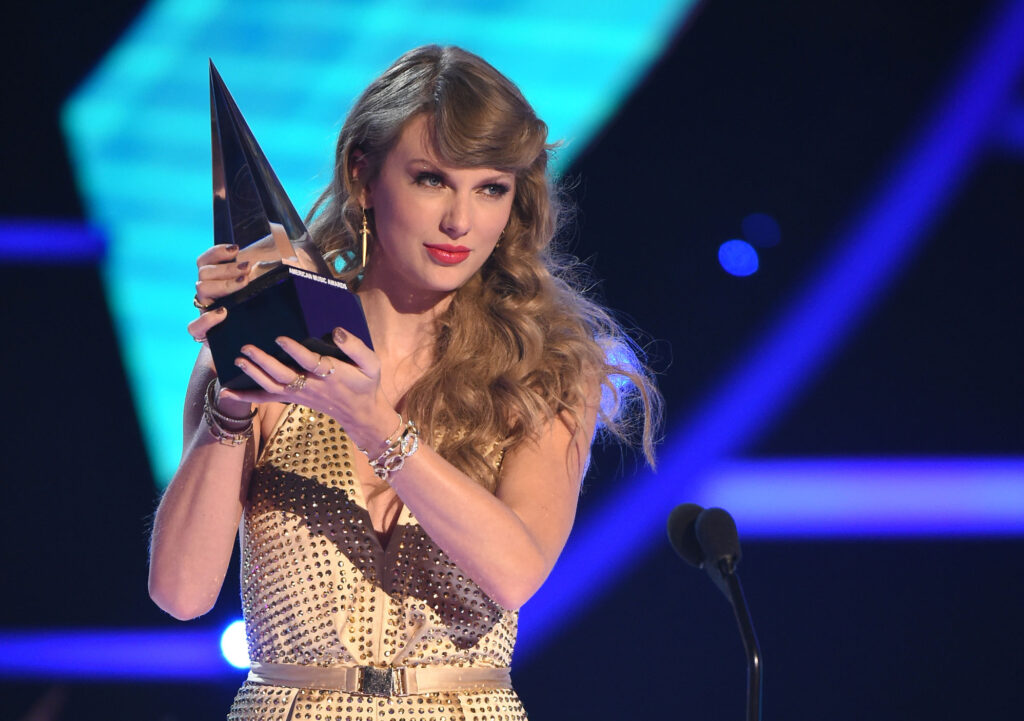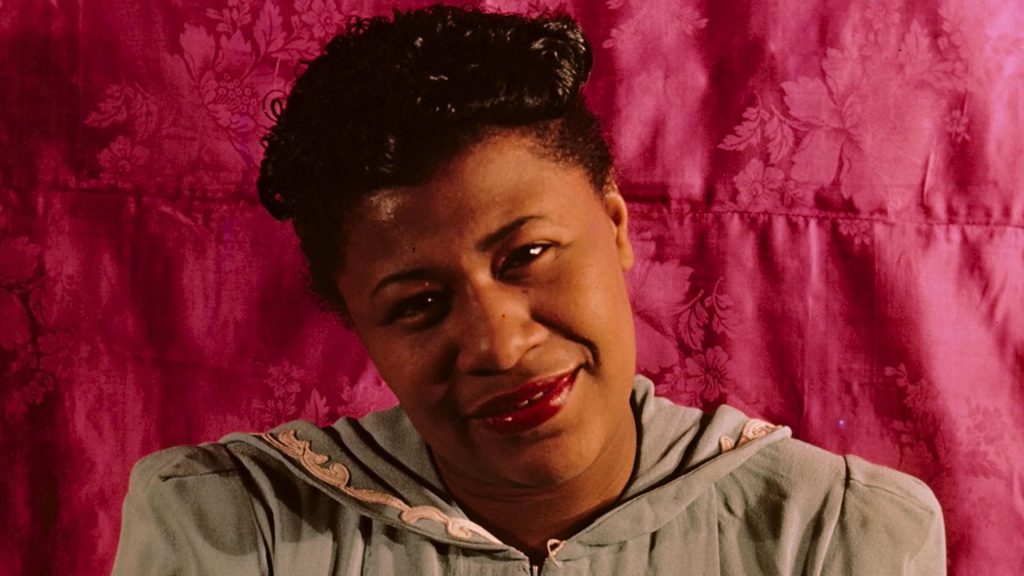December 31, 2022
by Carla Hay

“Dionne Warwick: Don’t Make Me Over”
Directed by Dave Wooley and David Heilbroner
Culture Representation: In the documentary film “Dionne Warwick: Don’t Make Me Over,” a group of African American and white people (and a few Latinos), who are celebrities, historians or philanthropists, discuss the life and career of entertainer Dionne Warwick.
Culture Clash: In her long career, Dionne Warwick battled against racism, misogynistic rap music and prejudice against people with HIV/AIDS.
Culture Audience: Besides appealing to the obvious target audience of Dionne Warwick fans, “Dionne Warwick: Don’t Make Me Over” will appeal primarily to people who are interested in biographies of entertainers who first made their mark in the 1960s.

“Dionne Warwick: Don’t Make Me Over” is both a retrospective and an uplifting story about one of America’s most treasured entertainers/activists who is both celebrated and sometimes underrated for her breakthroughs. This documentary doesn’t uncover new information, but it’s a thoroughly engaging and comprehensive look at the life and career of the talented, sassy and outspoken Dionne Warwick. It would be a mistake to think that this movie won’t have much appeal to young people, because “Dionne Warwick: Don’t Make Me Over” has meaningful themes and life lessons that can relatable to people of any generation.
Directed by Dave Wooley and David Heilbroner, “Dionne Warwick: Don’t Make Me Over” had its world premiere at the 2021 Toronto International Film Festival. Warwick also participated in the making of the 2018 PBS documentary “Dionne Warwick: Then Came You,” which focuses mainly on Warwick’s music, whereas “Dionne Warwick: Don’t Make Me Over” includes not just her music career but it also takes a much deeper dive into her personal life and her activism. Warwick’s 2010 memoir “My Life, as I See It” also covers a lot of the same topics as these documentaries. In other words, there’s no shortage of Warwick’s first-hand accounts of her life story.
Fortunately, Warwick is a great raconteur with amusing wit and candid self-awareness. There could be dozens of documentaries about her, and she’s the type of person who will give something unique and different every time in her documentary interviews. “Dionne Warwick: Don’t Make Me Over,” which unfolds in chronological order, has the expected telling of her experiences with fame and the challenges she’s encountered when people pressured her to be something that she wasn’t but she stayed true to herself.
Born in 1940, in East Orange, New Jersey, she describes her childhood in East Orange and nearby Newark as being in a family that was “middle-class and working.” Her father had various jobs, including being a Pullman porter, a music promoter and an accountant. Her mother was an electrical factory worker who also managed a gospel singing group called the Drinkard Sisters, which consisted of relatives on her mother’s side of the family. Warwick’s maternal aunt Cissy Houston (mother of Whitney Houston) was a member of the Drinkard Sisters. Cissy Houston is one of the people interviewed in the documentary.
With all this music talent in one family, it was inevitable that Warwick would pursue a music career too. She says her first performance was at the age of 6, when she sang “Jesus Loves Me” in church. Warwick also says that it was also the first time she got a standing ovation. “Gospel will never be far from what I do,” Warwick comments.
Warwick grew up during an era when much of the U.S. had legal racial segregation, but she says in the documentary that East Orange was a very integrated city. “It was like the United Nations,” she quips. It might be why she didn’t want to be confined to doing music that was labeled as being for any particular race. During the early years of her career, racial segregation also extended to the music industry, which marketed pop music as “music for white people” and R&B music as “music for black people.” Radio station playlists also followed these narrow-minded race divisions.
It didn’t take long for people to notice her talent. In 1957, she performed with the Imperials during Amateur Night at the famed Apollo Theatre in New York City’s Harlem neighborhood. They won that contest. “Dionne Warwick: Don’t Make Me Over” includes archival footage of that fateful performance.
She then became a backup singer, with credits that include the Drifters’ 1962 songs “When My Little Girl Is Singing” and “Mexican Divorce,” as well as Jerry Butler’s 1961 hit “Make It Easy on Yourself.” She stood out as a backup singer and was eventually signed to a record deal with Scepter Records as a solo singer. Warwick comments, “Thank God for my daddy, who negotiated my contract.” Warwick’s debut album, “Presenting Dionne Warwick,” was released in 1963.
The documentary repeats a fairly well-known story about how Warwick told the music producers of “Make It Easy on Yourself” that she didn’t like the results. That experience later became the inspiration for her 1962 song “Don’t Make Me Over,” which is a statement of Warwick’s refusal to be anybody but herself. It was an issue that would come up many times when people questioned her choices in songs, performing style or even her hairstyles and clothing.
For example, Warwick says in the documentary that when she was on tour with Sam Cooke, she ignored his advice to never turn her back to a white audience when she was singing. At shows where white people and black people would attend but would be racially segregated inside the venue, Warwick says she made a point of turning to sing to the black people, which meant that sometimes her back would be turned to the white people in the audience. It was Warwick’s way of telling the black people audience that even though they were being treated like second-class citizens by racist laws, the black people in the audience mattered to her.
Warwick also tells a story about the touring party going to a racially segregated restaurant, where a waitress took their menu order, but refused to let anyone in touring party sit in the restaurant. When Warwick cancelled the order because of this racist discrimination, the waitress then called the police on the touring party because Warwick didn’t talk to the waitress in a subservient way. Warwick says that Cooke got angry at Warwick because he thought Warwick defending herself from racism would get the entire touring party arrested.
Later in the documentary, Warwick says of the civil unrest and bigotry problems in the United States and elsewhere: “All of this craziness that happened in the ’60s, unfortunately, is happening again. What has changed? Nothing. But there is hope. Love is the answer.”
Warwick’s hit collaborations with songwriters Burt Bacharach and Hal David are duly noted in the documentary. Bacharach is one of the people interviewed in the film. David passed away in 2012, at age 91. The collaborations between Warwick, Bacharach and David resulted in Warwick’s biggest hits in the 1960s, including “Don’t Make Me Over,” “Anyone Who Had a Heart,” “Walk on By,” “I Say a Little Prayer,” “Do You Know the Way to San Jose” and “I’ll Never Fall in Love Again.”
In the documentary, Warwick talks about how her first major international success happened in Europe, but even her introduction to European audiences was marred by racism. Scepter Records put a photo of a white model on the cover of Warwick’s 1963 single “This Empty Place” when it was released in Europe, because the record company didn’t think European music buyers would respond to the song as well if Warwick’s photo was on the cover.
Warwick remembers European audiences being surprised and accepting when they would see her perform live for the first time and find out what she really looked like. She comments in the documentary: “Yeah, I ain’t white. I’m a tempting, teasing brown.”
Warwick adds, “My career really blossomed in Europe. It was exciting. I was treated like a little princess. It was a lot of fun.” She also talks about how actress/singer Marlene Dietrich became a mentor when Warwick spent time in Paris. Warwick says that Dietrich introduced her to haute couture fashion and encouraged Warwick to wear these types of designer clothes on stage.
With success comes inevitable criticism. Warwick often had to contend with people who would accuse her of “trying to be white” or “not being black enough” because her songs didn’t fit the expected R&B mold. (It’s the same criticism that her cousin Whitney Houston experienced when she became an instant crossover hit artist in the 1980s.) Not for nothing, Warwick became the first black artist to win a Grammy Award for Best Female Pop Vocal performance, for 1968’s “Do You Know the Way to San Jose.” It was also the first of her six Grammy Awards.
Any major entertainer whose career lasts for more than 10 years has ebbs and flows. Warwick says that in the 1970s, when her career was in a slump, Arista Records founder Clive Davis (one of the people interviewed in the documentary) convinced her not to quit the music business and signed her to a record deal. In 1979, she had a huge comeback hit with “I’ll Never Love This Way Again,” which earned her another Grammy Award.
“Dionne Warwick: Don’t Make Me Over” also includes a big segment on Warwick’s activism for AIDS causes. Several people in the documentary credit her with being one of the first celebrities to become an AIDS activist. Stevie Wonder, Gladys Knight and Elton John—her song partners in the 1985 mega-smash hit “That’s What Friends Are For” (another Grammy winner and a fundraising song for the AIDS charity amfAR)—share their thoughts on the experience and the impact that the song had for AIDS causes.
John says of Warwick: “She’s a hero of mine. She was one of the first people in the music business to speak up about [AIDS].” The documentary also shows Warwick meeting with amfAR CEO Kevin Robert Frost and designer/philanthropist Kenneth Cole at amfAR headquarters in New York City. Frost says that Warwick’s AIDS fundraising (including donating all of her royalties from “That’s What Friends Are For”) made a crucial difference in improving healthcare, research and other assistance for people with AIDS.
In the 1990s, Warwick spoke out against rappers having misogynistic lyrics in their music, even though she got some backlash for it. Snoop Dogg talks about how a meeting that he and other rappers had with Warwick in her home made such an impact on him, he decided to no longer have degrading lyrics about women in his songs. Snoop Dogg says the turning point was when Warwick got him to really think about how he would feel if someone used those misogynistic words on her or any of his female family members.
“Not much scares us,” Snoop Dogg comments on that pivotal meeting, “but this had us shook! We were the most gangsta you could be. But that day at Dionne Warwick’s, we got out-gangsta’d.” Warwick says of that experience of having a group of gangsta rappers in her home: “My sons thought I was out of my mind.”
Warwick also talks about her personal life, including briefly dating Sammy Davis Jr. in the 1960s (whom she also calls her “mentor” when she first performed in Las Vegas), and having a volatile marriage to actor/jazz musician William Elliott. The first time they married in 1966, they got divorced less than a year later. They remarried in 1967 and then got divorced again in 1975.
The former couple’s sons David Elliott and Damon Elliot are interviewed in the documentary. David mentions that his mother would sometimes divert her tour, just so she could go to one of his Little League games. “Those were special times,” he comments. Damon adds, “She’s the everything of the family.”
Friends and relatives say Warwick was devastated by the deaths of Whitney Houston (in 2012) and Whitney and Bobby Brown’s daughter Bobbi Kristina Brown (in 2015), who both died of drowning-related causes in a bathtub. The documentary includes a clip of Warwick’s speech at Whitney’s funeral. In a documentary interview, Warwick says she misses Whitney and Bobbi Kristina tremendously and thinks about them every day. Warwick is philosophical when she says that whatever time people have on Earth is best used in service of others.
Warwick also opens up about filing for bankruptcy in 2013, which her son Damon says happened because of “having an accountant who screws you over.” Warwick comments, “If General Motors can file for bankruptcy, why not Dionne Warwick?” There’s also acknowledgement that Warwick’s 1990s stint as a spokesperson for the Psychic Friends Network was a low point in her career.” Her son David says of her association with the Psychic Friends Network, “Unfortunately, it overshadowed her as a singer.”
As expected in a celebrity documentary such as “Dionne Warwick: Don’t Make Me Over,” other notable people in the film have nothing but praise for the celebrity. Former U.S. president Bill Clinton mentions that when he was courting his wife Hillary during a trip to Northern California, he wanted to visit San Jose, because of Warwick’s song “Do You Know the Way to San Jose.” He also says that when he was president of the U.S. in the 1990s, Warwick always pushed him to approve more federal funds for AIDS causes, and he appreciated how she always told him that whatever was given was “never enough.”
Barry Gibb talks about how he and Arista Records founder Davis had to work hard to convince Warwick to record the Gibb-written song “Heartbreaker,” which became a big hit for her in 1982. Gibb says, “If you want to make a great record, make a Dionne Warwick record.” Former U.S. congressman Charles Rangel gives the type of gushing comment that many of the other interviewee say in the documentary: “She is truly one of the greatest ambassadors of good will.”
Other interviewees in the documentary, whose screen time is really just reduced to sound bites, include Jesse Jackson, Gloria Estefan, Berry Gordy, Quincy Jones, Alicia Keys, Carlos Santana, Melissa Manchester, Chuck Jackson, Olivia Newton-John, Smokey Robinson, Valerie Simpson, Apollo Theater historian Billy Mitchell, radio DJ Jerry Blavat and National Museum of African American History director Lonnie Bunch. Because of this over-abundance of praise, the movie often veers into looking more like a tribute. However, because the documentary doesn’t gloss over some of Warwick’s low points in her life, and she talks about these low points, it’s saved from being a superficial, fluffy film.
Even when Warwick makes a self-congratulatory statement in the documentary, such as, “I am a messenger. I am carrying messages of love and hope,” it’s not too grandiose in the context of this film. “Dionne Warwick: Don’t Make Me Over” has plenty of evidence of Warwick’s lifelong actions for worthy humanitarian causes. Most of all, the documentary is testament to Warwick being an example of someone who can have staying power in showbiz without having to invent any personas and without compromising who she really is.
CNN will premiere “Dionne Warwick: Don’t Make Me Over” on January 1, 2023.



